The parliamentary standing committee on Food, Consumer Affairs, and Public Distribution presented a report regarding the Procurement, Storage and Distribution of Food grains by the FCI in August 2021. The government has now presented its action taken report. Here is a review.
Food security is an important element of a nation’s stability and prosperity. The starting point for ensuring food security is the procurement stage, followed by storage, and distribution. In India, the primary task for ensuring the smooth flow of the above process is entrusted with the Food Corporation of India (FCI) established under the Food Corporations Act, 1964. The objectives of the FCI, as mentioned on their website are:

Lately, there have been multiple questions raised about the storage and other costs of the FCI because of the excessive food grain stocks. A whole lot of issues surrounding the procurement, and storage are explained in detail by Factly in the series on FCI here, here, here, and here.
In light of these, the parliamentary standing committee on Food, Consumer Affairs, and Public Distribution presented a report titled, ‘Procurement, Storage and Distribution of Food grains by Food Corporation of India’ to the concerned Ministry in August 2021. The report was examined by the Government, and it provided the actions taken against the specified recommendations. The latest report titled, ‘Action Taken by the Government on the Recommendations/ Observations contained in the Thirteenth Report of the Committee (Seventeenth Lok Sabha) on the subject ‘Procurement, Storage and Distribution of Food grains by Food Corporation of India’ was recently presented in the parliament. We look at important issues highlighted in this report focussed on specific aspects of the process flow.
On Decentralized Procurement System (DCP)
The State Governments directly purchase, store, and distribute food grains under the 1997–1998 Decentralized Procurement Scheme (DCP). In accordance with this plan, the States purchase, store, and distribute food items for the TPDS and other government of India welfare programmes. Under the DCP system, the State Government and its agencies purchase, store, and distribute rice, wheat, and coarse grains throughout the State (against GOI’s allocation for TPDS & OWS). The excess rice and wheat that the State and its agencies have purchased are given to FCI in the Central Pool.
Since the DCP mode entails significant obligations by the states such as planning for funding, storage space, gunny, manpower, etc, they hesitate to embrace the DCP system. The committee in its original report was aghast by the non-participation of states in the DCP system.
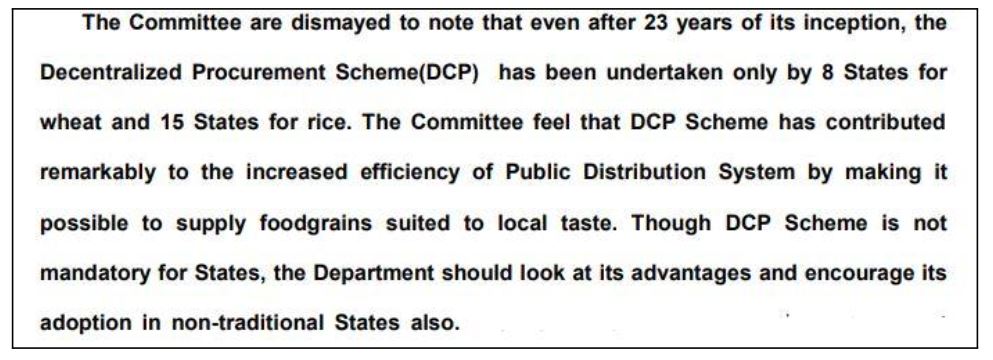
In its action taken report, the Government replied that all efforts towards the adoption and implementation of the DCP model are being done. Regular follow-ups and clarification sessions on the concerns raised by the states are also being done.
The committee felt that despite the active measures by the Government of India, the low adoption of DCP mode is a concern. The committee noted that the ministry did not provide the committee with the details of difficulties faced by the states or reasons for the non-adoption of this scheme. Hence, the committee reiterated its earlier recommendation of encouraging states to adopt the DCP model and taking proactive measures and suggesting remedial measures if any issues arise.
On Storage and Transit losses
Storage and transit losses pose a financial risk to the efficient functioning of the FCI. Despite various measures, these losses are still high, with transit losses amounting to Rs. 280.94 crores in 2020-21 (till October 2020). This is a slight decline compared to Rs. 286.39 crores in 2017-18. The committee asked the department to continue its efforts to minimize the losses in the future. It also took note of the cases initiated against the officials against unjust transit and storage losses. Below is the data on action initiated, as provided by the ministry.
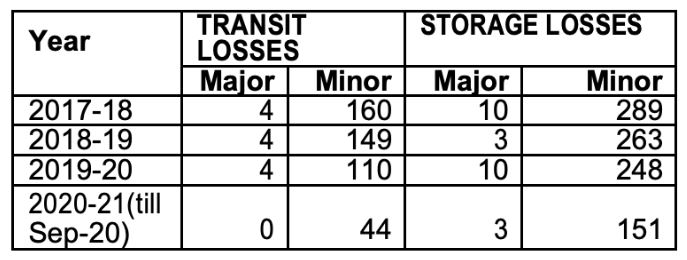
Out of these, 17 minor cases in Transit losses, and 81 minor cases in storage losses are pending, and in major cases, 1 in transit loss and 8 in storage losses are pending as of 30 September 2020. The committee recommended FCI to fix its own standards and guidelines to ensure extra vigilance by the employees. Also, a framework for resolving pending cases be reviewed and necessary steps for the disposal of cases must be initiated in a timely manner.
The Ministry replied that some quantities of transit losses are inevitable, and proactive measures taken to mitigate storage losses were apprised to the committee. The committee felt that the reply of the Government was silent on the disposed of cases. Accordingly, the committee reiterated its earlier recommendation of stringent actions against delinquent officials, and the storage and transit losses should be curbed by vigorous efforts.
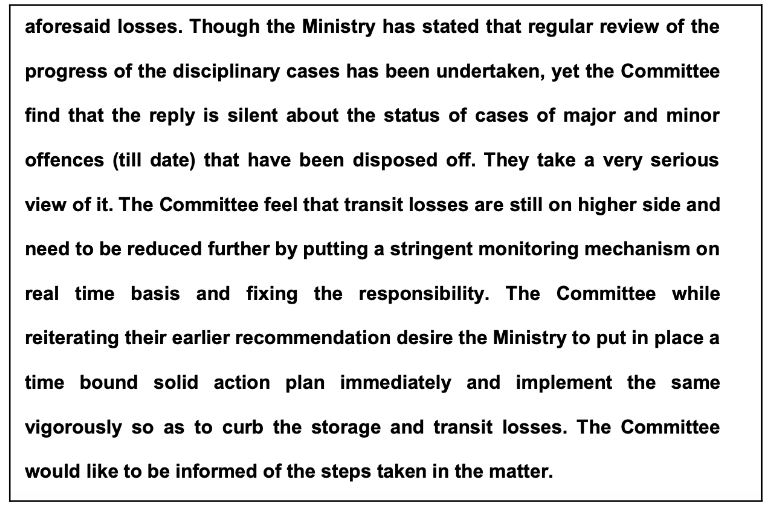
On Corruption in FCI
Corruption anywhere has the potential to destroy the smooth flow of operations. From 2018-18, many cases have been registered against the FCI officials by the vigilance department. The cases stand at 817, 828, 691 and 406 respectively from 2017-18 to September 2020. Accordingly, the committee recommended the ministry strengthen the vigilance mechanism and ensure stringent action against the erring officials. It recommended the periodic transfer of FCI officials so that the creation of vested interests is not made possible.
The Ministry replied that the trend of closing balance of cases is declining, showing the corporations’ commitment to speedy and timely disposal of cases. Additionally, it apprised the committee of various steps taken to minimize corruption in FCI.
The committee has once again emphasized the necessity of speedy disposal of vigilance cases and asked the Ministry to frame a transfer policy after a period for the FCI officials.
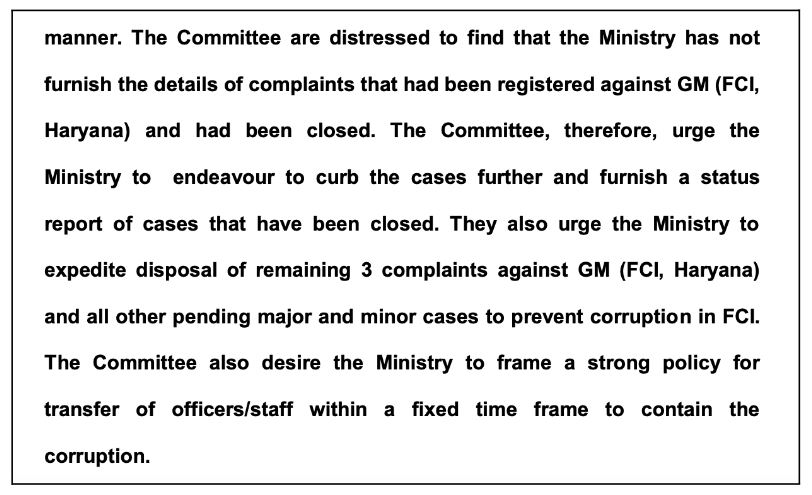
On Capacity Utilization of owned capacity:
Capacity utilization plays an important role in the storage process of food grains. Inefficient capacity utilization could lead to an increase in the costs of the storage, putting financial stress on FCI. The committee in its original report noted that despite repeated checks and audits, the capacity utilization of covered/hired and CAP/hired (as on 01 June 2020) is still very high i.e., 95% and 132% respectively. The corresponding owned capacity utilization is 75% and 20% respectively. The Committee hoped that hiring godowns would only be used in extreme cases and that efforts will be made to keep the rent paid to various agencies to a minimum in this context. Therefore, the Committee strongly advised that FCI fully use their own storage capacity (whether covered or cover and plinth (CAP)) before leasing any storage capacity in order to conserve valuable resources used to take the storage space on rent.
The Ministry responded that there shall always be a variation in capacity utilization owing to the different stock levels at different points in time. It also mentioned that CAP is only used as the last resort for stock storage. Adequate audits are well established to prevent unnecessary expenditure on storage.
The committee’s recommendation for maximum utilization of owned capacity before leasing any storage capacity has been accepted by the Government.
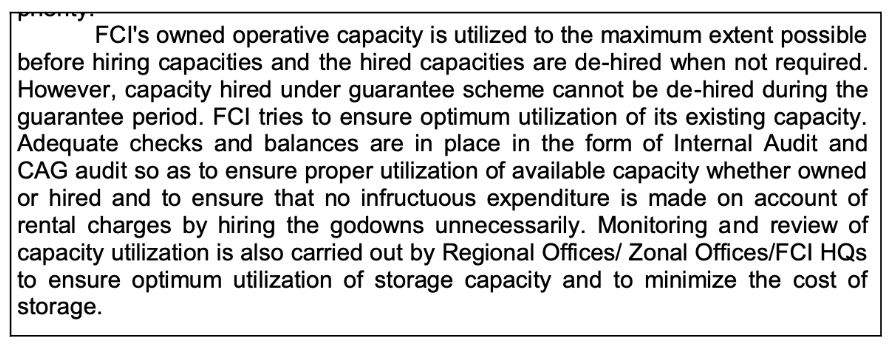
On damage to food grains
The committee in its original report expressed concern about the damage to the food grains. The committee noted the high damage to the food grains from 2017-18 to 2020-21. It noted the primary reasons for such damage to food grains were due to the pests’ attack, poor quality procurement, leakages in godowns, exposure to natural calamities, or due to the negligence of officials/officers. While the damage due to natural calamities is beyond human control, the damage caused by human negligence must be eradicated at any cost. In a country where malnutrition and hunger are rampant, such negligence is of grave concern.
The Ministry replied that because of the proactive steps taken by it, the losses due to human negligence are very minimal. During the years 2017–18, 2018–19, and 2019–20, a meager amount of 2663, 5213, and 1930 Tons of food grain, has become “non-issuable” which is just 0.006 percent, 0.010 percent, and 0.004 percent, respectively, all stocks handled in the relevant years.
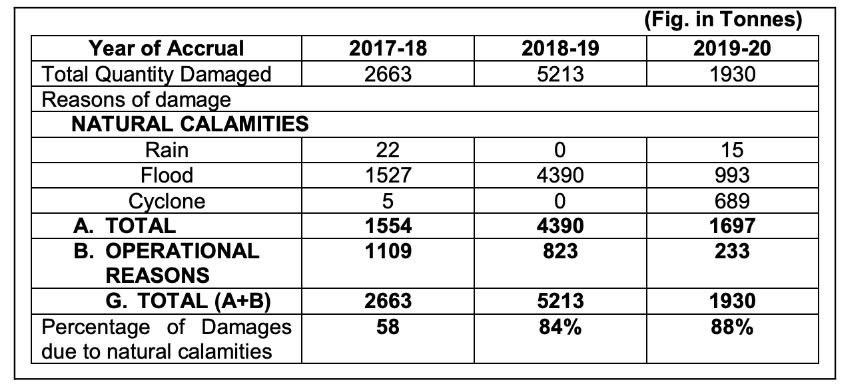
From the above figures, it is quite clear that the share of losses due to natural calamities is increasing, significantly. The Ministry also apprised the committee about the steps taken by the corporation to prevent the food grains from becoming, ‘non-issuable’. The Government had accepted the recommendations of the committee on food grain damage minimization and is working towards its implementation. It provided the status of the scientific storage capacity enhancement in major procuring regions using non-cultivable land to build silos/warehouses.
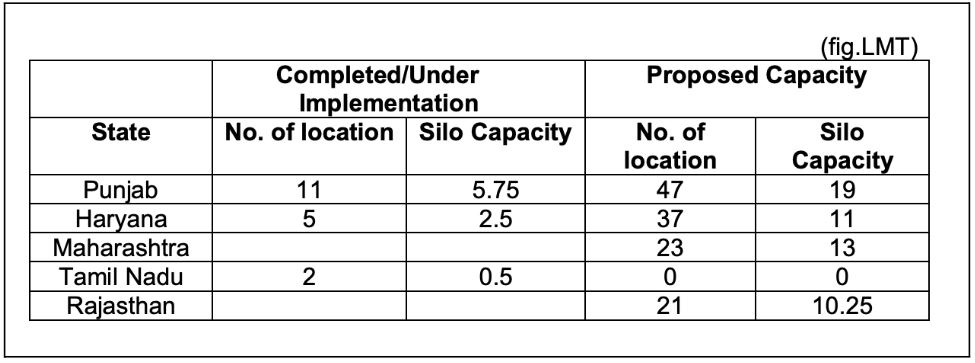
On Diversion of food grains
Diversion of food grains meant for the needy is one of the biggest menaces in the efficient functioning of the public distribution systems. The committee noted that from the year 2017 to 2020, 1213, 941, 855 and 2469 complaints were received respectively in the department. Most of these complaints were related to the diversion of food grains, ineligible persons getting the benefits, leakages in the distribution network, and the quality and quantity of the food grains. Since the public distribution system is significantly funded, it is vital that such a system is not prone to leakages and diversions.
The Ministry in its reply said that the states/UTs are instructed to furnish utilization certificates (UCs) in respect of food grain allocation under NFSA 2013 every year. Regular follow-ups are being made to ensure the states/UTs file the UCs in a timely manner. On the complaints received, the Ministry responded as below.
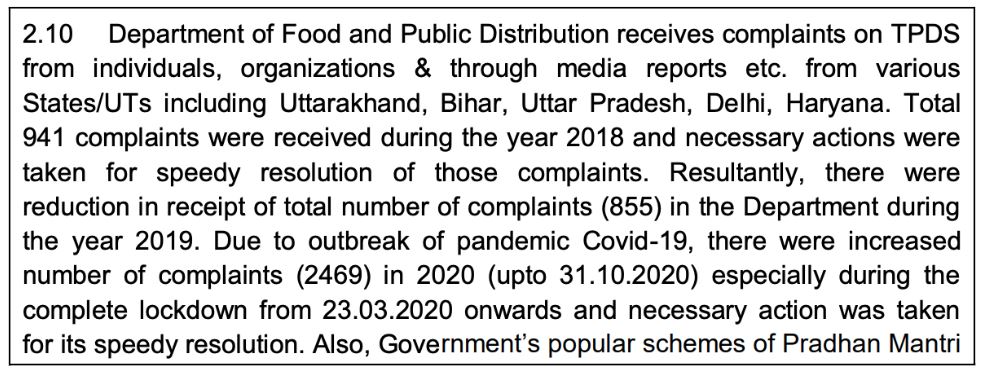
As per the recommendation of the committee to ensure strict monitoring mechanisms and to take the issue of enforcement and monitoring seriously, the Government accepted those recommendations and is working towards the implementation of those recommendations.
Featured Image: Distribution of Food grains by FCI


